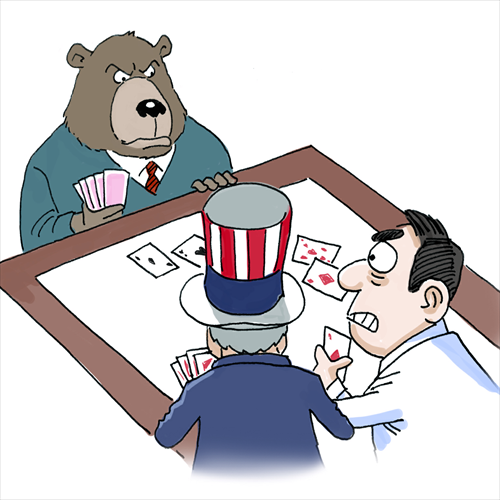US reluctant to allow Moscow deal for Japan

Illustration: Liu Rui/GT
Although it has been 70 years since the end of WWII, in a very technical legal sense a state of war still exists between Japan and Russia. In the period since the Soviet era, the two have almost reached a peace treaty several times, but the deal keeps being put off due to the dispute of the Kuril Islands, or known as Northern Territories in Japan. Recently, the islands have once again become a hot spot.
Last year, Japanese Prime Minister Shinzo Abe pledged to the lower house of parliament that he would solve the dispute during his tenure. Therefore, the Japanese government has invited Russian President Vladimir Putin for a state visit at a time when Russia is mired in multiple crises, hoping Putin will give way on this issue during his visit.
During the Sochi Winter Olympics last year, Putin and Abe negotiated a possible visit by Putin in August 2014, but Japan was among the Western bloc that imposed sanctions on Russia. Therefore, Russia postponed the visit. In May when Chairman of the Russian State Duma Sergey Naryshkin visited Japan, Abe raised the issue again and Putin accepted the invitation.
However, the visit is more easily promised than actually made. Recent plans by the Russian government to develop the Kuril Islands and visits by Prime Minister Dmitry Medvedev to Iturup, one of the four disputed islands, make Putin's visit elusive.
This September, the Eastern Economic Forum will be held in the Russian city of Vladivostok and will announce a series of plans to develop the country's Far East, including an investment budget of nearly 70 billion rubles ($1.08 billion) to develop the Kuril Islands.
Medvedev reportedly has a personal desire to land on Iturup Island. Quite a number of the Russian elite, represented by Medvedev, do not take Japan's stance into consideration at all.
The Japanese government is obviously dissatisfied with Russia's behavior. A few days ago, Japanese Foreign Minister Fumio Kishida said he would visit Russia to negotiate Putin's visit to Japan, but later he claimed that his visit would be suspended if Medvedev visits the disputed islands again.
Once Medvedev lands on the islands as he planned, which is his third recent visit, and given that Russia has indicated its firm will to control the Kuril Islands via its Far East plans, Japan is very likely to view Russia's moves as setting out a hard-line stance in the territorial disputes. Therefore, Japan may reconsider whether to continue to push forward Putin's Japan visit.
After all, it is Japan that has been actively seeking a possible Putin visit. Japan hopes that Putin, known for his pragmatism, can make some compromise in the territorial disputes, as his country has been undergoing both economic and diplomatic dilemmas. Former House of Representatives member Muneo Suzuki once said Japan could recognize Crimea's "return" to Russia and cancel its sanctions against Moscow in exchange for Russia's compromise over the territorial disputes.
Russia advocated solving the disputes in accordance with the joint declaration signed by the Soviet Union and Japan in 1956 that calls for a permanent peace treaty to solve the territorial disputes, but Japan wants to obtain all the four disputed islands.
Therefore, the Russian side holds a negative attitude toward Putin's visit to Japan. Valery Kistanov, director of the Center for Japanese Research at the Institute of Far Eastern Studies, Russian Academy of Sciences, believes that the discrepancies between Tokyo and Moscow are firmly fixed and will not see a breakthrough in the near future.
Yet a variable factor in Russia-Japan relations is the stance of the US. On the issue of Putin's Japan visit, while the Abe government has sent out contradictory signals, the White House still has been imposing pressure on the Abe administration.
Oleg Matveychev, a professor with close ties to Putin from Moscow's Higher School of Economics, claims that Japan is not a completely sovereign country because the Japanese government cannot decide on its own. He argues that whether Japan can cancel its sanctions on Russia and whether it can negotiate anything with Russia depends on the stance of the US.
When Abe visited the US, US President Barack Obama reportedly requested Abe to adopt a measured approach to Putin's visit to Japan. During the G7 summit, in response to Obama's call, Japan agreed to put pressure on Russia over the Ukrainian crisis together with the other G7 members. The US will never allow Japan to be a lever for Russia in dealing with the West.
The author is a PhD candidate at the Center for Russian Studies, East China Normal University. opinion@globaltimes.com.cn